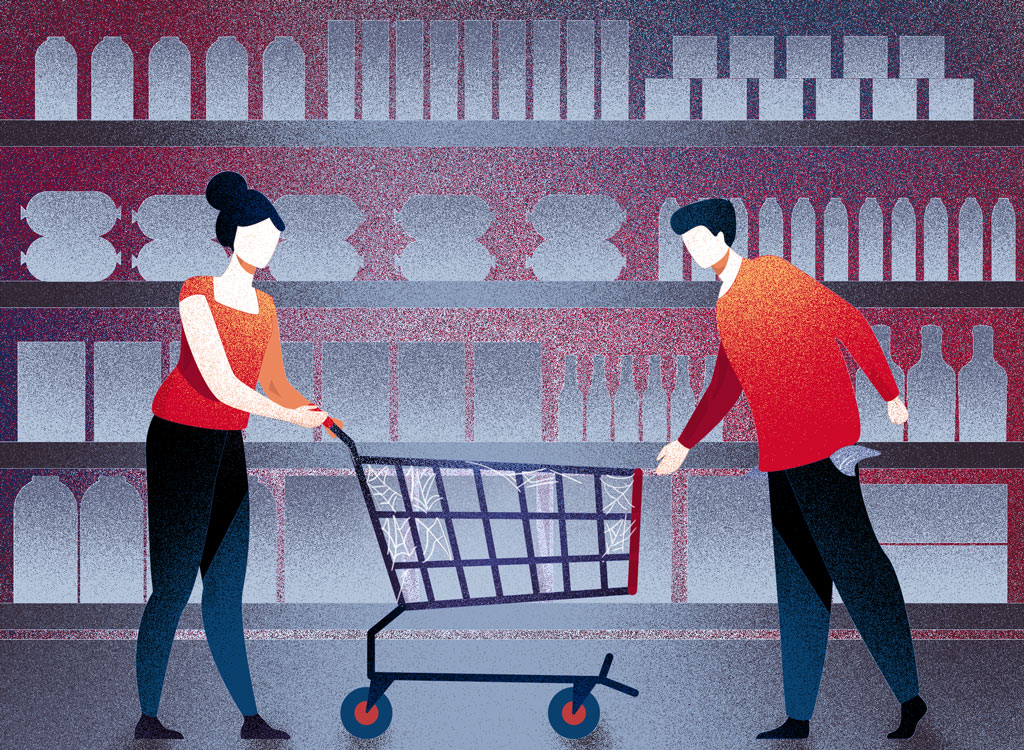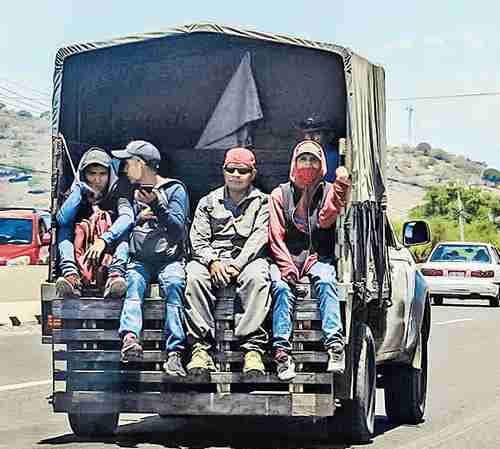When her life partner gets a ‘course’ in the construction field, Fanny Hernández (20 years old, unemployed, mother of a one-year-old son), is happy because she will be able to buy some food for that day and, if she was lucky, and he got a little more money, he will be able to buy a few pounds of rice, some beans, and a liter of oil.
“From the meter, yes, because that is worth 70 córdobas per liter. Not the other, because it is more expensive”, she clarifies. Meanwhile, she fills a sack with scrap metal, and on days when he doesn’t get any, she goes to the nearby junkyard and sells the contents for fifty córdobas.
The last time they gave him only 25, because that day there was nothing to eat, so he didn’t have time to wait for the sack to be filled.
Their reality is very similar to that of hundreds of thousands of heads of families, especially those who are in charge of buying food and find it necessary to juggle trade, to ensure that they will be able to put some food in each dish that is served in your home… even if it is not enough, neither in terms of quantity, nor nutritionally speaking.
In their regular diet, Fanny and Léster have coffee, bread, and cream for breakfast and, if they can, spend 100 or 150 cordobas for their lunch. Whatever is left will be combined with cheese or cream to make dinner. Add to that two bundles of firewood that are only enough to cook two pounds of beans, with the aggravating circumstance that, in winter, the firewood is wet (or green), and produces more smoke than fire, which irritates Francisco, his son little.
Fanny’s predicament –and like hers, that of thousands of other households– is explained by a statistic calculated by the Nicaraguan Institute of Information for Development (Inide), which shows the excessive growth of 20.3%, in the price of food in the basic basketbetween May 2021 and May 2022.
The average price of the ‘food’ component in the basic basket of May last year was 10,026.61 cordobas, and grew by 2,036.11 cordobas, to be valued at 12,062.72 cordobas at the close of May 2022.
Economist Enrique Sáenz explains that “if we want to analyze how the price increase affects the vast majority of families, the first reference is the cost of the basic food basket published by INIDE.” In particular, it recommendsanalyze how the food component movesbecause the vast majority of Nicaraguans spend their entire income on food, and a good part of it is not even enough for that, so that is the true indicator to see how it affects the vast majority of families.”
The distant dream of shopping in a supermarket
Mrs. Blanca Torres’s income is so meager that she feels that “only the rich can go to supermarkets.” She assures that: “with the little I get, I only have enough to buy rice, sugar and beans to eat for a week”. Her income is made up of a pension of 2,200 córdobas, and perhaps 150 to 200 córdobas that her daughter obtains, the days that she gets a job for a day in textile workshops.
The little money the two women make is stretched in ways no economist can learn in college, to feed four adults (one of whom is mentally handicapped, legally making him a minor) and one teenager. Being so small, women are forced to make sacrifices to ensure that children eat a little more.
“I see that the prices of the basic basket are becoming more expensive every day. Can you imagine how that affects those who earn a very low salary, if everything is going up?” Torres reflects, as if she herself does not have to make decisions on a daily basis to try to supply three meal times… only to start over at the same time. next day.
“This is all very difficult. Sometimes I get rice, and if I can, I mix it with eggs to feed the two children, and the older ones settle for a glass of pinolillo, or one of oatmeal”, with the result that “we have all lost about ten weight pounds”.
Remember that more than three years ago they were given food aid, but it was taken away after 2018. The last time they ate meat was a week ago, because one of the family members had a birthday, so they made a great effort to eat ‘something special’.

The rest of the time, the protein comes from the egg, and they buy cheese when production is so high that prices plummet. If there is no money to buy food, it is even more difficult for the money to be enough to buy gas for cooking, but that is not a problem, because in that case “I put three stones on the ground, and I buy fifteen cordobas of firewood, which is only enough for me to prepare a meal time”, he refers.
If the problem of this family is overwhelming, it is even more so to know that “these are structural problems that have been around for a long time, and whose improvement would require actions in the medium and long term”, says economist Marco Aurelio Peña.
When speaking of ‘structural problems’, he refers to the level of production in the country, the quality of jobs, the business culture, the way business is donethe treatment of workers, private investment, and public investment, which are what determine the generation of employment, expanded.
The same wages, with less purchasing power
Doña “Azucena” (who requests anonymity to avoid conflicts with members of her family who are related to the government party), is already a retired woman who, due to her age, rarely leaves her house, and even less to do the shopping, But she observes the difficulties that her daughter has to bring home the same amount of food as before, and serve five dishes of food, three times a day.
From her daughter’s stories, she knows that some foods have increased, such as rice, beef and vegetables that they need to apply an alternation strategy: one day they have meat for lunch, another day they have noodles; the next day meat, and the next a pipián stew. As a staple, cooked banana instead of plantain. Cheese, just to accompany a gallopinto. If they want a natural drink, they think about it, because it costs 40 cordobas to buy pitahaya and lemons.
The reality of Doña “Azucena” and her family is similar to that experienced by the majority of those who earn their living as workers, because in Nicaragua, nominal and real wages maintain a stationary trend, without forgetting that through Over the years, real wages have rather been declining, notes the economist Peña.
The result is that “the wage earner is left receiving more or less the same amount of money (nominal income), while inflation erodes his purchasing power and eats away at his real income, and there is less and less what he can acquire with his salary.” net, in the case of those who have a formal job,” he said.
Although the blow that this family receives is less than the common denominator of the country – to the reduced pension that “Azucena” receives, we must add the income of her son-in-law and her daughter to cover the expenses of five people – she feels that “we are fortunate, because in most households there is only one salary”.
This family has adopted a fortnightly basis to make their purchases, generally in supermarkets such as La Unión and Pricesmart, and although there are other chains that have better prices, “they don’t always have what you need.” In addition to buying what they plan to consume in two weeks, they still have to visit the grocery store daily to buy bread, cheese, avocado, jícaro seeds, fruit, or wait for street vendors to pass by.
prioritize food
In the family of Ivania Rodríguez -who works as a primary and secondary home tutor- there are several workers, which determines that the finances of her household depend on more than one salary, as well as on the pension received by her father, without let that mean that they are not affected by the way they increase the cost of living.
“I don’t understand why there is a rise in prices, since there is enough production, the cost of gasoline has been parked for several weeksthe roads are good… I think it’s due to hoarding”, he theorizes, clarifying that the crisis suffered by many families does not affect them so much, not only because there are several incomes, but because “we take care of our consumption, without spending on superfluous things , and we prioritize food.”

Sáenz explains that part of the answer to Professor Rodríguez’s questions comes from afar. From the Ukraine, where a war is being fought, or from Moscow, where it was decided to wage that warwhose effects were added to previous international distortions that affected the rise in the price of food, oil, and the fertilizers.
The economist invites us to see what happened in 2021, when these ‘distorting factors’ could not be blamed for what was happening in Nicaragua, recalling that the price of food rose 15% in 2021, the year in which the pension average retiree, which is C$6,000, received an adjustment of 2%. The result is “one hundred and twenty córdobas that go towards the purchase of two pounds of cheese,” he pointed out.
State workers did not fare much better, since his ‘readjustment’ was 3%, while those who only earn the minimum wage barely received 7% more, which guaranteed that 2021 would close “with more hunger and poverty. Also, according to INIDE, more than 60% of the working population is unemployed and underemployed or they are unpaid workers”, he specified.
Beyond the explanations of the experts, the teacher Rodríguez looks for local answers, narrating that “when the price of cheese went up, I stopped buying cheese so as not to please the intermediaries, and I switched to eggs. Now they say that carrots and cucumbers are expensive because of the rains, but in Matagalpa, which is where they are produced, it has always rained,” she says.
But if she looks for the answers inside Nicaragua, there are many who look for them outside. Peña highlights how poverty, unemployment, inflation that decreases household consumption, “pushes people to migrate for economic reasons. The Nicaraguan votes ‘with his feet’, search the labor markets of other countriesto generate income and help their families by sending monetary remittances”.















